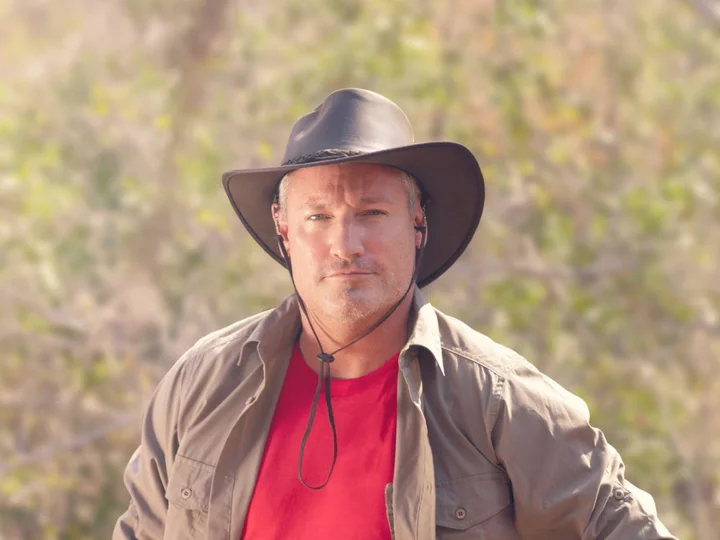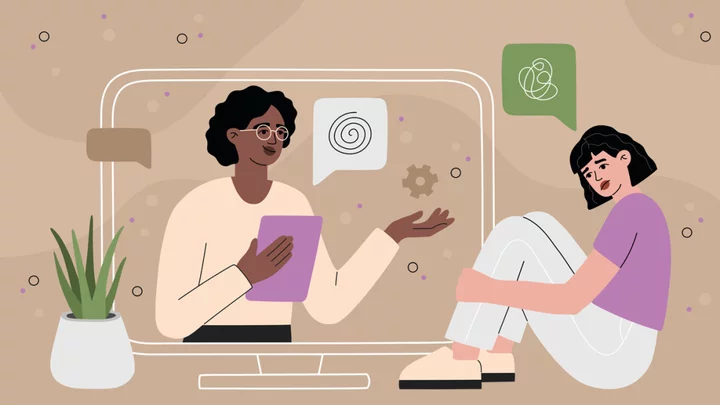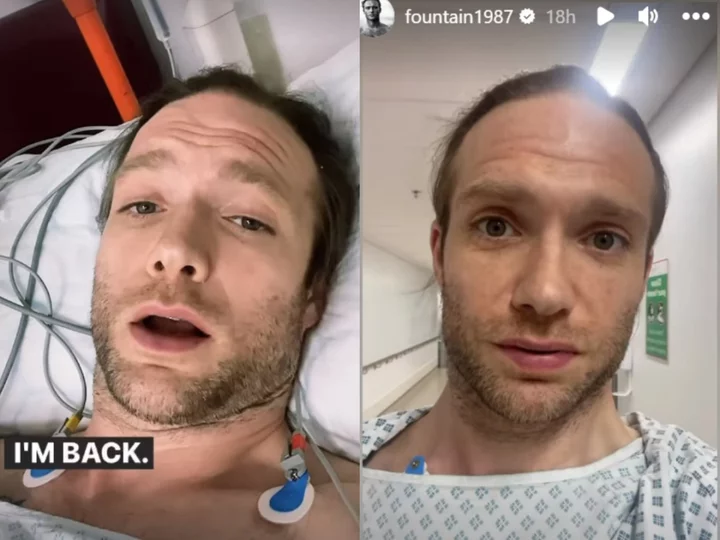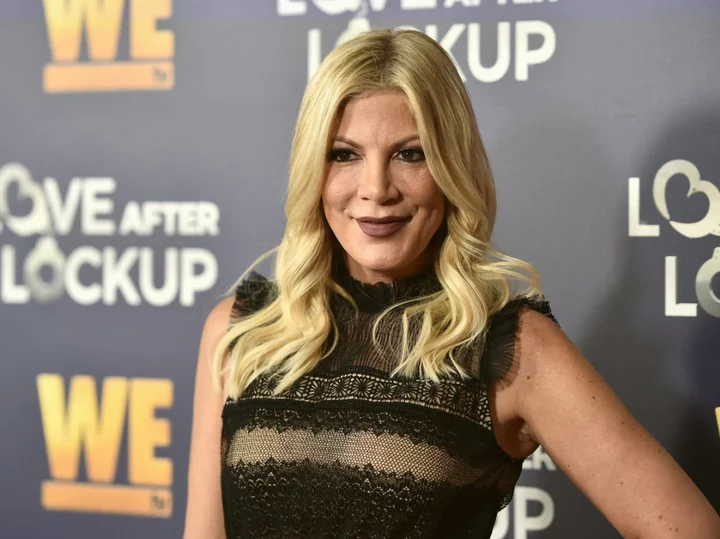
Baby talk: Talking to toddlers boost early brain development, study finds
The more you talk to a toddler, the more it helps their brains to develop in early childhood, a study has found. Researchers discovered that two-and-a-half-year-olds who heard more speech in everyday life had more myelin in language-related areas of their brains. Myelin is a material produced by the body that forms around nerves, including those in the brain, that allows electrical impulses to transmit quickly and efficiently. Scientists from the University of East Anglia said their findings demonstrate how speaking to toddlers can shape their developing brains. The study, published in the Journal of Neuroscience, involved 163 babies and toddlers being given small recording devices to wear for three days. Researchers analysed just over 6,000 hours of language data in total, including words spoken by the children and speech from adults. When the children were asleep, they were carefully placed in an MRI scanner to measure myelin in their brains. The researchers found that toddlers who heard more speech everyday had more myelin, which they said is “likely to support more sophisticated language processing”. Lead researcher Prof John Spencer, from UEA’s School of Psychology, said: “We know that children’s brains develop very rapidly in the first two years of life, with brain volume at about 80 per cent that of an adult brain by the age of two. “Myelin is made up of protein and fatty substances and forms an insulating layer around nerves in the brain.” He added: “Imagine you have a hosepipe with lots of holes in it. “Myelin is like wrapping the hosepipe with duct tape – it insulates neural fibres, bringing more of the ‘signal’ from one brain area to the next.” The researchers said their study is one of the first to show that listening to speech is associated with brain structure early in development. Prof Spencer said: “Prior work showed a similar association in four to six-year-olds, but our findings push this association much earlier in development. Indeed, we even found associations between language input and brain structure in six-month-old infants.” He added: “Although there is still much more to learn about these processes, the message to caregivers is clear – talk to your baby, your toddler, your child. “Not only are they listening, but your language input is literally shaping their brains.” Additional reporting by PA Read More Rihanna and A$AP Rocky celebrate son’s first birthday ‘I don’t get angry’: Pierce Brosnan says meditation is key to managing anger TikTok Tattoogate: How a tattoo artist sparked backlash for ‘absurd’ pricing and design changes Dean Gaffney says I’m A Celebrity ‘saved his life’ after bowel cancer scare Talented boxer reveals first sign of brain tumour after collapsing at service station GB News in ‘significant breach’ of Ofcom rules over Covid vaccine claims
2023-05-15 13:45

Dean Gaffney says I’m A Celebrity medics ‘saved his life’ after bowel cancer scare
Dean Gaffney has credited the medical team of ITV’s I’m A Celebrity… Get Me Out of Here! for catching a sign of bowel cancer early and “saving” his life. The former EastEnders star said he underwent a medical examination in 2020 as he was being considered for an appearance on the show’s Covid-safe version at Gwrych Castle in Wales. The doctors flagged that Gaffney was "losing blood somewhere" after routine blood tests and initially thought he could have anaemia or an iron deficiency. Speaking to the Mirror, Gaffney, 45, admitted he “thought they were being a bit over the top”, but following a colonoscopy, doctors found a number of polyps in his large intestine and referred him for surgery immediately. “There is no doubt I’m A Celeb and its medical team saved my life. I might not be here today if it wasn’t for them finding what they did,” he said. Gaffney divulged that he was admitted to hospital “within hours” and was “under general anaesthetic” when “they took it out”. Recalling the moments after he woke up from the surgery, Gaffney said the doctor told him: “Had you not come to us today, in three years that could have turned to bowel cancer. You’ve been very lucky.” “I still remember his exact words,” Gaffney said. “I feel so, so lucky. It’s made me so careful about checking my stools.” Gaffney wants to raise awareness around bowel cancer, following in the footsteps of the late Dame Deborah James, who died last June of the disease. He described the Bowelbabe activist and fundraiser as “an inspiration to so many”. “I have so much respect for her fight and the awareness she raised for bowel cancer,” he said. “If I can do a small fraction of that for men, it’d make me very happy.” Detailing what the doctors had found in his large intestine, Gaffney said the polyps were “massive” and one was “20mm, which is big for a polyp”. “They didn’t mess about, they put me under general anaesthetic, operated and burned the polyps away. When I came round, I could see the doctors were slightly angry with me and it was serious,” he continued. “They didn’t mince their words and said how lucky I was it had been found now. I was stunned.” The doctors wanted to know why Gaffney had not noticed blood in his stool, to which he replied that he did not “make a habit of looking at my stools”. “Any time I’ve ever seen a bit of red I just think, maybe I’ve had peri-peri sauce,” he added. “I’m so grateful to the people on the show for bringing it to my attention. I check my stools all the time now. I’d urge others to do it too.” Read More Pierce Brosnan says he simply ‘doesn’t get angry’ Bowel cancer ‘red flags’ that can show two years before diagnosis Hairy Bikers star Dave Myers says one food has helped him return to work after cancer treatment GB News in ‘significant breach’ of Ofcom rules over Covid vaccine claims Ex-Corrie star Chris Fountain shares updates after heart surgery for ‘mini-stroke’ Bo Jackson says he will undergo procedure after year-long battle with chronic hiccups
2023-05-14 20:57

Talented boxer reveals first sign of brain tumour after collapsing at service station
A professional boxer forced to give up his career after a brain tumour was missed by medics for six years told how he was determined to get his life back. Dad-of-two Peter McDonagh, 45, collapsed at a service station in February 2019 after he stopped the car and started vomiting. He was taken to hospital by ambulance, where he underwent a CT scan which identified a brain tumour near his left ear. An MRI was performed, which identified a mass around 2.7cm by 2.7cm with surgeons removing most of the tumour before radiotherapy. But Peter was devastated to be told the mass had been identified on scans in 2013 and 2017, which were carried out for him to renew his boxing licence. Peter, from Leatherhead, Surrey, hoped to return to his old job as a fishmonger, but it was too unsafe due to issues he now has with balance. He now suffers hearing loss, facial palsy, balance disturbance and psychological symptoms, and is plagued by ‘what ifs’ - but is looking forward to getting hitched. Peter said: “Being diagnosed with a brain tumour was a huge shock to me as I’d been undergoing routine scans for many years so I would’ve expected anything abnormal to have been picked up in those. “One of the main things I’ve struggled with as a result of the tumour is my ongoing symptoms and also having to give up my career. “Boxing was a huge part of my life and I’ve found it really tough to come to terms with no longer being able to compete and do what I love. “After my surgery, I tried to return to my pre-boxing trade of a fishmonger but I also had to give that up as I was unable to balance and the risk of getting hurt was too high. “Since then, I get angry and upset sometimes when I think things may have been different if it the tumour been found sooner. “However, I am on the road to recovery and try my best not to dwell on ‘what ifs’ and focus on my future. The consultant neuroradiologist responsible for performing annual MRI screening on Peter as part of his boxing career, admitted that in 2013 and 2017 a brain tumour was visible on scans but wasn’t reported at the time, which “fell below a reasonable standard of care.” It was also admitted that had it been reported, Peter would have undergone earlier treatment - but as it was missed it continued to grow from 2013 to 2019. Peter collapsed on February 4 2019, when he stopped the car, vomited and fell to the ground. After a CT scan was carried out, he went to A&E four days later complaining of dizziness, and was told the CT scan had found a tumour, which was also visible on a subsequent MRI scan. Previous brain scans for his annual boxing licence were reassessed. On March 12 2019, Peter underwent a 15-hour surgery with the aim of removing around 95 per cent of the tumour, leaving a small mass on the facial nerve to allow it to function properly. He was discharged from hospital five days later, with a plan for six-monthly MRI scans. On 15 March, 2021, radiotherapy was performed following growth of the residual tumour. Two years on, Peter continues to be affected by problems with his hearing and balance, as well as occasional facial twitching and tingling, and he also struggles with his mental health. Since retiring from boxing, Peter is now writing a book about his life and the day-to-day difficulties he faces. He added: “While I would give anything to turn back the clock and change what’s happened, I know that’s not possible. “All I can do now is work hard on my rehabilitation. “I’ve had such great support and I’m determined to get my life back. “I’ve even started writing a book and I hope that by sharing my story, I can show others that there’s help out there.” Thomas Riis-Bristow, specialist medical negligence lawyer at Irwin Mitchell, said: “The last four years have been incredibly difficult for Peter, firstly being diagnosed with a brain tumour but then also having to give up a career he loved as a result. “While he is making great progress with his recovery, he continues to struggle with a number of issues, both physically and emotionally, which have a significant impact on not only him but also his family. “We therefore welcome the admission’s made which will help ensure Peter can benefit from the ongoing rehabilitation he needs to help him move forward with his life. “As part of Action for Brain Injury Week, we join Peter in sharing his story to raise awareness of the help available. We’ll continue to support him as he continues with his recovery.” Action for Brain Injury Week runs from May 15-21 and is supported by the charity Headway. Read More Bowel cancer ‘red flags’ that can show two years before diagnosis Hairy Bikers star Dave Myers says one food has helped him return to work after cancer treatment ‘Hundreds’ of cancer patients denied vital treatment as Israel and Gaza trade fire Father shares cancer symptoms he thought was too much coffee Dean Gaffney says I’m A Celebrity medics ‘saved his life’ after bowel cancer scare GB News in ‘significant breach’ of Ofcom rules over Covid vaccine claims
2023-05-14 20:50

The Doctor Is In (Your Phone): 6 Online Therapy Services to Try
These are trying times. The pandemic has left us steeped in worry, grief, and isolation.
2023-05-14 02:54

Former Coronation Street star Chris Fountain shares hospital updates after heart surgery for ‘mini-stroke’
Actor Chris Fountain has shared footage from the hospital following his heart surgery. The former Coronation Street and Hollyoaks star was admitted for an operation on his heart, months after suffering a “mini-stroke”. On social media, he updated his followers with posts to his Instagram stories on Friday (12 May). “I’m back, baby,” Fountain, 35, said to the camera while laying in his hospital bed. “Still feeling a little bit woozy, my groin is rather sore. But I’ve finally been allowed to eat and drink, but the cheese sandwich didn’t quite do it.” He added that his mother, who was in the room with him, would be going to find him something more substantial to eat before signing off. Later, he shared a video originally posted by Dutch musical theatre actor Martijn Vogel that explains the procedure that had been performed on him. Fountain’s surgery was to address a patent foramen ovale (PFO), which is described by the NHS as a hole between the left and right atria (upper chambers) of the heart. People with this condition are at a higher risk of stroke. If a PFO does not fix itself, the surgery to treat it consists of inserting a catheter with a closure device through the femoral vein in the leg up to the heart, where the device is left to close up the flap. In a later video, Fountain is seen walking around the hospital. “Back on my feet, they’ve cleared me to walk a little bit,” he said. “What a day! To be honest, I was really quite nervous when I went into the anaesthetist room, it all became very real.” He concluded on a positive note, telling fans that the outlook looks good so far after tests were run to check that the device is “in the right place and working, and not leaking”. The actor starred in more than 300 episodes of the long-running ITV soap, Coronation Street, from 2011 to 2013. He was fired after videos of him rapping about rape were discovered on YouTube. Since then, Fountain has addressed the impact that his firing has had on his life. Read More TikTok Tattoogate: How a tattoo artist sparked backlash for ‘absurd’ pricing and design changes Millie Mackintosh says she was ‘ghosted’ by Meghan Markle after she started dating Prince Harry Elliot Page praised for shirtless photo: ‘It feels so good now’ One in five people may be suffering from ‘dangerous’ sleep disorder Bo Jackson says he will undergo procedure after year-long battle with chronic hiccups As Coronation Street puts the spotlight on sepsis, the signs and symptoms to know
2023-05-13 19:49

Samantha Womack ‘would have delayed’ cancer treatment to strike with NHS staff
Samantha Womack has said she would’ve delayed her own cancer treatment in solidarity with striking NHS staff who “shouldn’t be eating from food banks”. The former EastEnders actor, 50, announced she had been diagnosed with “brutal” breast cancer in August last year – shortly after Dame Olivia Newton-John died from the disease. Last December, NHS doctors and nurses went on a nationwide strike demanding better pay amid a cost-of-living crisis and rising inflation. Describing herself as a “huge advocate” of England’s national health service, she called it “one of the best gifts we have” in an interview with Press Association. She added: “But when you’ve got the people who are working as hard as they are doing the hours they are, not being supported, even if it would have delayed my own personal treatment, “I would have been out there fighting with them, because I’m absolutely desperate for them to be paid properly and appropriately for what they do,” she continued. “They certainly shouldn’t be eating from food banks.” She also told the agency Newton-John’s death made Womack want to share her own diagnosis, “because I thought everyone knows someone that’s got cancer”. “It was very poignant for me when I got my diagnosis that she had lost her battle and they happened within the same timeframe,” she explained. Womack, who played Ronnie Mitchell on the hit BBC soap until 2017, told fans in January 2023 that she had overcome breast cancer. The British actor is now lending her support to a campaign enabling greater access to a new AI breast cancer diagnostic tool called Digistain. The UK’s first breast cancer risk profiling solution, Digistain helps patients better understand their cancer and the specific treatment that will most benefit them. Womack said she didn’t know about Digistain when her cancer was diagnosed, and that she was “anxious not to have chemotherapy” if she didn’t require the “brutal treatment”. “I knew that there was a test called the Oncotype test, which is very similar....(but) it’s incredibly expensive so it’s just not available to most people,” she added. Womack said the test gives a ratio of how beneficial chemotherapy would be and she was “on the fence” so had two rounds before making the decision to stop. Last October, Womack gave fans a health update while receiving the treatment, explaining that she had gotten her appetite back but was struggling with migraines. Elsewhere in the interview on Friday (12 May), Womack reflected on life after being given the all-clear and how it has changed her perspective. “It’s apparent in every little thing that you think,” she continued. “It’s a bit like learning to think and speak in a different language and it’s quite exhausting, because you’re not quite the same person that you were so everything is just slightly shaded in a different colour.” Read More Rainy bike rides and jellybean bribes: The secrets of royal coronation photographer Hugo Burnand Taylor Swift fans react to new photo ‘confirming’ Matty Healy romance: ‘I’m going to cry’ The Bear star Jeremy Allen White’s wife Addison Timlin reportedly files for divorce Meghan is ‘cuckoo’ in royal nest and her ‘woke hang-ups’ will destroy marriage, says Labour grandee Robert De Niro reveals name of newborn daughter as he shares first photo of seventh child
2023-05-12 18:29

Am I just tired or is it ME?
ME, or myalgic encephalomyelitis, is a serious, long-term chronic illness that impacts the sufferer, leaving them often suffering from extreme exhaustion. ME has for a long time been under-researched, but as awareness of the condition grows, more people are coming forward for help. As a grouping of symptoms, instead of a clearly identifiable illness, ME is very hard to diagnose and thus people can suffer for years before getting help for it. Symptoms can include exhaustion, digestive issues, muscle weakness, shortness of breath and irregular heart rate. But how do you know if you are suffering with ME, or are just really exhausted? Overlapping symptoms Covid has made ME more prevalent, but people still find it so difficult to know what may just be tiredness. “It is really difficult to tell the difference. ME and CFS (chronic fatigue syndrome) have a lot of overlap [with tiredness] and there have been a lot of issues with long covid with these long persisting post-viral malaise, where even if people sleep well, they may still feel exhausted,” says GP and men’s health specialist Dr Anand Patel. If you have had covid or another viral illness, this may increase the likelihood of having ME. Get checked out “If you have had persisting symptoms for more than a few weeks or they are really severe, speak to your GP,” says Patel. Particularly if “you are sleeping okay, your diet, caffeine and alcohol intake are okay, but your symptoms are persisting. They may check your thyroid and blood count”, he explains. “A quarter of our appointments these days are classed as ‘tired all the time’. It is very difficult to weed out what is what when ME and CFS are groups of symptoms that are bundled together. It is not necessarily something that will cause medical harm, but will cause really significant symptoms to sufferers,” says Patel. “With ME, you may be so tired you can barely stay awake in the day. We are still in the exploratory stage of what does cause it, but if you have had psychological trauma or illness it is more likely to be ME that has caused these prolonged symptoms. It can be hard to find things during tests and scans, but of course, there are conditions we don’t have tests for or are hard to identify,” he explains. Be clear of your symptoms “It is really difficult to diagnose something if you can’t find it, so a patient needs to explain symptoms and how they are feeling. Many people with it don’t feel seen, and a doctor may be struggling to find a specific answer,” Patel explains. Keeping a diary of symptoms may help to make it clear. Vitamin deficiencies Consider what the other causes may be. “Tiredness could be caused by blood count and anaemia, thyroid function and deficiencies, dietary changes and vitamin deficiencies,” says Patel. “If you have a varied diet, these are unlikely. B12 and folic acid deficiency are common, they make blood make new cells and are important in nerve function. Also, it could be vitamin D deficiency, a lot of people need to take a vitamin D tablet every day in the UK because we don’t get enough sun and slap on factor 50 as soon as it does come out,” Patel says. Read More Charity boss speaks out over ‘traumatic’ encounter with royal aide Ukraine war’s heaviest fight rages in east - follow live Dr Alex George: Five months of sobriety has made a ‘huge difference’ Everything you need to know about Sophie, the new Duchess of Edinburgh Beyonce kicks of Renaissance tour in string of glamorous outfits
2023-05-12 15:29

4 signs you’ve eaten too much salt
Feeling the urge to glug a glass of water shortly after you’ve munched a packet of crisps, bowl of popcorn or handful of peanuts, is a clear sign your snack was on salty side – and that’s not necessarily a bad thing. “Salt is a necessary requirement to eat – and not for flavour,” says Pippa Hill, nutritionist and founder of The Weight Loss Guru. Table salt, aka sodium chloride, contains around 40% sodium, an essential nutrient. “Eaten in a small quantity, sodium helps the conduction of nerve impulses, muscle contraction and relaxation, and helps maintain the balance of water and minerals,” she continues. “A lack of salt can lead to muscle cramps, nausea, fatigue and light-headedness.” However, consuming more than the 6g a day recommended by the NHS for adults – equating to around one teaspoon – can be detrimental for your health. “A high salt intake disrupts the natural sodium balance in the body,” says Olivia Burley, registered associate nutritionist who is currently working on the NHS Diabetes Prevention Programme. This can result in high blood pressure, she explains: “Hypertension is a condition where blood pressure remains elevated over time, which can increase the risk of heart and circulatory diseases.” Unless you keep a very close eye on food labels, it’s not always obvious how much salt you’re eating in a day. “Examples of foods high in salt can be canned fish or poultry, frozen foods such as breaded meats, salted nuts, canned beans, cured meats, soup and sandwiches,” says Hill. And just because you’ve drunk enough water to quench your thirst doesn’t mean you’re negating the effects of too much salt, which is why it’s important to be aware of other health indicators. “If you are experiencing any or all these symptoms, it is always best to seek medical advice,” Burley advises. 1. Headaches The dehydration caused by excess salt intake can lead to severe headaches. “These headaches tend to be more painful than a mild one, giving a throbbing sensation as the blood vessels are being expanded,” Hill says. “They tend to come on between an hour or two after you’ve eaten, as sodium levels rise through the body.” They may come on quicker if you have high blood pressure or suffer from chronic headaches in general, but can often be solved by rehydrating. “As your water levels are imbalanced, by drinking more water you’re able to minimise and get rid of the headache.” 2. Swollen feet and hands Also known as edema, swelling of the fingers, ankles or feet can be a delayed reaction to a spike of sodium. “When too much salt is consumed, the body retains the extra sodium and increases the fluid outside of the cells, Burley explains. “This causes the kidneys to have reduced function, remove less water and therefore increase blood pressure.” Swelling may occur more when sitting down for too long or on long journeys. “This isn’t an instant response after eating, but if in the next 24 hours of having eaten salty foods you notice swelling in these areas, it could be a link,” Hill says. “It’s best to seek medical advice if this is an ongoing occurrence, as it could be a sign of a more serious health concern.” 3. High blood pressure “Salt is the largest cause of high blood pressure,” Hill warns. “Within just 30 minutes, eating excess salt will have a bodily reaction to the blood vessels.” Also called hypertension, if left untreated it can increase your risk of serious problems such as heart attacks and strokes. Hills says: “If after eating a salty diet, your symptoms include blurred vision, chest pain such as a tight feeling, palpitations, shortness of breath or sudden nosebleeds, it could mean you have a raised blood pressure.” Burley adds: “Hypertension can often have no symptoms and the only way to know your blood pressure is to get it monitored using a machine.” 4. Frequent urination “Excessive thirst is a common response to eating salty foods and naturally leads to an increase in fluid consumption, causing excessive urination,” Burley says. By sending the signal that you need to guzzle lots of liquid, the body aims to remove the excess salt build-up. “Although drinking more fluids in response to an increase in salt is one of the main reasons for urine production, it could be a symptom of other conditions like polyuria, therefore medical checks are best.” Read More Charity boss speaks out over ‘traumatic’ encounter with royal aide Ukraine war’s heaviest fight rages in east - follow live Am I just tired or is it ME? Dr Alex George: Five months of sobriety has made a ‘huge difference’ Everything you need to know about Sophie, the new Duchess of Edinburgh
2023-05-12 15:25

Peloton recalls two million bikes after adjustable seats cause injury hazard
Peloton has recalled more than two million bikes due to safety concerns caused by the adjustable seat breaking during use. The US Consumer Product Safety Commission issued a recall for about 2.2 million bikes after receiving 35 reports of the bike’s adjustable seat post “breaking and detaching” during rides, including 13 reports of injuries such as fractured wrists, lacerations, and bruises from falling. The recall affects bike model PL01, which was sold from January 2018 to May 2023 for about $1,400 and manufactured in Taiwan. “Consumers should immediately stop using the recalled exercise bikes and contact Peloton for a free repair,” the CPSC said in a statement, adding that Peloton is offering customers a free seat post that can be self-installed. Peloton said bike models can be identified by the label on the inside front fork of the bike, near the flywheel. This is not the first time Peloton has faced a widespread recall. In May 2021, the exercise company was forced to recall 125,000 of its treadmills following the death of a six-year-old child and dozens of other injuries. The CPSC said Peloton began receiving reports of incidents and injuries with the treadmills as early as December 2018, but failed to promptly report the treadmill hazards. The New York-based company agreed to pay a $19 million fine. The Independent has contacted Peloton for comment. Read More Parents sue Peloton after three-year-old child is left with third-degree burns from treadmill Peloton issues warning to keep kids and pets away from treadmill after child killed Peloton recall faulty pedals from 27,000 bikes following injuries
2023-05-12 00:27

Dr Alex George: Five months of sobriety has made a ‘huge difference’
Dr Alex George has revealed that more than 150 days without alcohol has been “a challenge” but has made a “huge difference” to his life. The former Love Island star, TV doctor and now the UK government’s youth mental health ambassador shared that drinking at weekends would sometimes affect him for up to four days afterwards. The 32-year-old quit his A&E doctor job 18 months ago to focus on bringing the public accessible health advice, often on TV – including Channel 4’s Naked Education – and five months ago, he cut out booze too. “It’s made a really huge difference,” George says. “I get to bed at 9pm every night, I wake up at 6am, I listen to music, I play music, I go to the gym, I spend quality time with a small number of people – I’ve developed really, really strong boundaries about how I spend my time and who I spend it with.” It’s an “investment” in himself, he says, but it isn’t always easy. “When you’ve got a bank holiday weekend and a lot people are sat in a beer garden – that is a challenge. Because even if you’re not addicted to alcohol, and you’re just a part of the British culture, you’ll feel challenges of not drinking in those times. “But it’s looking at what will future Alex be grateful for – you know, that delayed gratification.” It’s a topic he explores in his latest book, The Mind Manual, on the mental fitness foundations to give us all a boost – just in time for Mental Health Awareness Week (May 15-21) – including how to hold better boundaries and why mistakes are part of life. “I didn’t like how alcohol made me feel,” George, who also hosts the walking and wellness podcast Stompcast, says. “I was drinking pretty standard-ish for a young person in their 30s, but after four, five or six beers on a Saturday night, I’d feel bad – that would affect me a small percentage [of the time] all the way up to Tuesday or Wednesday.” “It affected my desire for the gym, it affected the way I ate, it affected the relationship I had with myself – so I had a really honest conversation with myself.” His book is about asking people to challenge things: “Question why are you doing this behaviour?” During some self-reflection when he was still working in A&E, George says he realised he wasn’t practising what he preached. “I thought, ‘I’m here talking about finding balance and looking after your own mental health, and I’m actually damaging my own mental health by doing too much.” Self-worth is often so tied up with the roles we have in our careers, so it was a difficult decision to leave, he says. “Since the age of 12 or 13, I’d wanted to be a doctor. You sacrifice a lot, university is tough, I worked in King’s College Hospital then Lewisham Hospital [London]. It was my passion, I covered a lot of the pandemic – on social media, it was my identity. “But I think sometimes, it’s really, really important to remember that just because your identity is a part of your life, it doesn’t have to be your identity your whole life. Walking away or changing direction [doesn’t mean] that time of your life is now devalued. “Even though I am not ‘Alex the A&E doctor’ anymore, it is all ingrained in who I am.” He’s had a significant impact as a public health doctor though, securing £79million of funding towards mental health support teams in schools in 2021. He’s thankful for the platform Love Island fame afforded. “Of course, if it wasn’t for that show, I wouldn’t have got that [money] for the kids.” He also started the #postyourpill campaign on social media – trying to banish the stigma around taking medication for mental health issues, like the anti-depressants he was prescribed last year. He’s also tirelessly campaigned for suicide prevention awareness and better early intervention for people with mental health issues, after his 19-year-old brother Llyr died by suicide in 2020. Heartbreakingly, George had been due to go home to Carmarthen, Wales, to see his family for the first time since the pandemic. “The week before my brother passed away, my best friend’s dad was terminally unwell and I stayed in London. In that time that I stayed, my brother passed away, so I could have seen him. “You question whether that’s a mistake or not. It’s very complex, because you don’t see the bigger picture always. [If] you know that a decision would have a certain outcome and it was a negative outcome, you wouldn’t make that decision a lot of the time. “I think that’s probably one of the biggest ones that I’ll have to live with.” Now though, George says he’s received “thousands – if not tens of thousands – of messages” and comments in person from strangers struggling in a similar way to Llyr, but saying they’ve now got help. “How many lives have been saved off the back of Llyr’s death? There’s an element of, ‘What can we control?’ I can’t turn back time, all I can do is try and support other people with their mental health.” The book discusses the ‘mental health toolkit’ George developed while he was grieving and growing – “Not just as a tribute to Llyr but as a tribute to the mental anguish I have faced in life, both before and since his death”. It includes written exercises to help readers audit their feelings as well as ‘universal truths’ to cling to in dark times, like “sleep is a saviour” and “connection is your superpower”. He adds: “Grief is with us for life. It’s never OK that person has died.” But we can find ways to “organise” that grief in our minds. Plus, difficult times are key for personal growth. “Sometimes, you have to walk through hell,” he says, “It sounds really dark, but in some ways, through difficult experiences, you learn a lot by yourself. You will know your resilience and your ability to cope with things. You also learn what helps you cope.” For George, that means walking (“a lifeline for me”), a few close friends and hiit classes at the gym. “In the last few years, there have been some significant highs and lows, but I do think what I’m grateful for is that in adversity, you learn a huge amount. I endured.” The Mind Manual by Dr Alex George is published by Aster, £20. Available now in paperback, and also as an ebook and audiobook. The Samaritans helpline is available 24/7 on 116 123. Read More Charity boss speaks out over ‘traumatic’ encounter with royal aide Ukraine war’s heaviest fight rages in east - follow live Everything you need to know about Sophie, the new Duchess of Edinburgh Beyonce kicks of Renaissance tour in string of glamorous outfits Pensioner, 85, shares the simple switch that’s helped him to do 650,000 press-ups
2023-05-11 20:46

Ricky Gervais says he’s ‘lived through the worst eight hours of illness’
Ricky Gervais has given fans a health update after “living through the worst eight hours of illness” of his life. On Thursday (11 May), the After Life star, 61, tweeted he isn’t “well today” and shared that he was suffering from symptoms such as severe abdominal pains, vomiting, hot sweats, and chills. “Oh, and I really want to know who planted the 12 gravy bombs up my a***,” Gervais quipped. Some Twitter users suggested he might be suffering from norovirus – or the “winter vomitting bug” – in the comments section. “Sounds like it is Noravirus [sic] that is going around. My friend and my daughter and son-in-law have had it. It is awful. Hope you get better soon,” one person said. Gervais replied: “Yeah, that’s what I thought.” Another person wrote: “Eight hours seems like a magic number when I get norovirus. I’m good for a full shift every time.” Other fans joked about the abundance of detail in Gervais’s descriptive post, with one person calling it the “perfect sick note”. “Just copy and paste that description, and voilà – you’ve got yourself a guaranteed day off. Even your boss will be too terrified to question it,” the comment read. In March this year, the number of norovirus cases in England rose to their highest levels in nearly a decade. The count fell from its peak shortly after but remained above levels reported in March 2022. Norovirus is one of the most common kinds of stomach bugs in Britain, and reportedly affects between 600,000 and a million people in the UK every year. The six most common symptoms include sudden onset of nausea, projectile vomiting, diarrhoea, high temperature, abdominal pain, and aching limbs. It spreads from contact with an infected person or contaminated surfaces. Most people who contract the virus will recover within two to three days. Norovirus, however, can cause dehydration, especially among the very young, elderly, and those with weakened immune systems. Read More Chrishell Stause and G Flip announce marriage after one year together Duchess of Edinburgh ‘praying’ for elderly woman hit by her royal motorcade Sir Karl Jenkins responds to claims that he was Meghan Markle in disguise at coronation: ‘I was surprised’ What is sepsis? Five symptoms you need to know A man thought he felt spaced out from drinking coffee. Then came a ‘huge shock’ Pensioner, 85, shares the simple switch that’s helped him to do 650,000 press-ups
2023-05-11 20:17

Tori Spelling says ‘extreme’ mould kept her children in ‘spiral of sickness’
Tori Spelling has documented how “extreme” mould impacted her family’s health, revealing they have been caught in a “spiral of sickness” for months. On Wednesday (10 May), Spelling, 49, gave her fans a health update on Instagram after discovering mould in their rental home. She shared pictures of her youngest children, Finn, 10, and Beau, 6, at an urgent care centre, explaining that they’ve been “so sick they are sleeping all day and say they feel dizzy even [while] standing”. Spelling captioned her post: “We’ve all been on this continual spiral of sickness for months. Sick. Get better. To get sick again. Used to think… well that’s what happens when you have young kids in school. They just continually bring sicknesses home. “But, when it gets to the point where they are at home sick more than being in school we had to reassess what was going on,” she wrote. After an inspection, Spelling discovered the “extreme” mould infestation which was making her family sick. “You just keep getting sick, one infection after another. Respiratory infections. Extreme allergy like symptoms too and, like my poor Finn, skin rashes as well,” the Beverly Hills 90210 alum said, outlining the various health conditions that had been triggered by the infestation. She said Finn was also suffering from Strep throat and had a high fever. Calling the house a “health hazard”, Spelling said she would be moving her family into an AirBnB or a vacation rental “till we can even grasp what to do”. The mother-of-five also criticised her children’s school for not believing “our kids were as sick as they’ve been continually”. Fans thanked Spelling for “bringing light to this public health emergency in our country” and shared recommendations for doctors who can help with mould-related infections. A recent survey found that more than a fifth of UK homes are suffering from damp. Read More Rihanna’s baby son’s Wu-Tang Clan-inspired name is finally revealed Viral coronation song: No, the choir did not sing ‘I love vagina, Camilla’ Chrishell Stause and G Flip announce marriage after one year together ‘Queen of the mommy bloggers’ Heather Armstrong dies aged 47 Man diagnosed with brain tumour after putting symptoms down to drinking coffee One in five people may be suffering from ‘dangerous’ sleep disorder
2023-05-11 17:57
